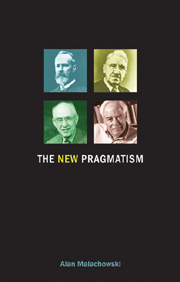Book contents
- Frontmatter
- Contents
- Preface
- Acknowledgements
- Abbreviations
- 1 Introducing the New Pragmatism
- 2 Leaving classic pragmatism behind
- 3 Rorty against the tradition
- 4 Putnam's contributions
- 5 Putnam and Rorty: pragmatism without reconciliation
- 6 Prospects
- Conclusion: the New Pragmatism and philosophy
- Notes
- Reading the New Pragmatists
- Bibliography
- Index
4 - Putnam's contributions
- Frontmatter
- Contents
- Preface
- Acknowledgements
- Abbreviations
- 1 Introducing the New Pragmatism
- 2 Leaving classic pragmatism behind
- 3 Rorty against the tradition
- 4 Putnam's contributions
- 5 Putnam and Rorty: pragmatism without reconciliation
- 6 Prospects
- Conclusion: the New Pragmatism and philosophy
- Notes
- Reading the New Pragmatists
- Bibliography
- Index
Summary
I hope to convince you that pragmatism offers something far better than the unpalatable alternatives which seem to be the only possibilities today, both philosophically and politically.
(Hilary Putnam, Pragmatism: An Open Question)Hilary Putnam is a prolific and influential philosopher who has had a long and distinguished academic career. In his case, we do not need to fill in as much background detail as we did with Rorty. For, although Putnam has never been afraid of courting controversy, his philosophical career has been much more conventional that Rorty's. As a result, his views have not been inordinately clouded or distorted by the fog of public notoriety.
Putnam's contributions to the growth of the New Pragmatism have spanned some thirty years or so. During this lengthy period, Putnam's overall position has been revised a number of times, and to the extent that more recently, as James Conant has pointed out, he has “become increasingly disenchanted with putting forward new philosophical ‘positions’ of his own” (in Putnam 1995b: xii). Given Putnam's deep dissatisfaction with the reductive aspects of overly abstract or narrowly technical approaches to philosophical issues, his eventual adoption of what we might call a ‘positionless position’ might, with hindsight, look inevitable. And no doubt this has some bearing on how we should view his relationship to the New Pragmatism. However, there is another sense in which his philosophical direction has never wavered.
- Type
- Chapter
- Information
- The New Pragmatism , pp. 61 - 82Publisher: Acumen PublishingPrint publication year: 2009



